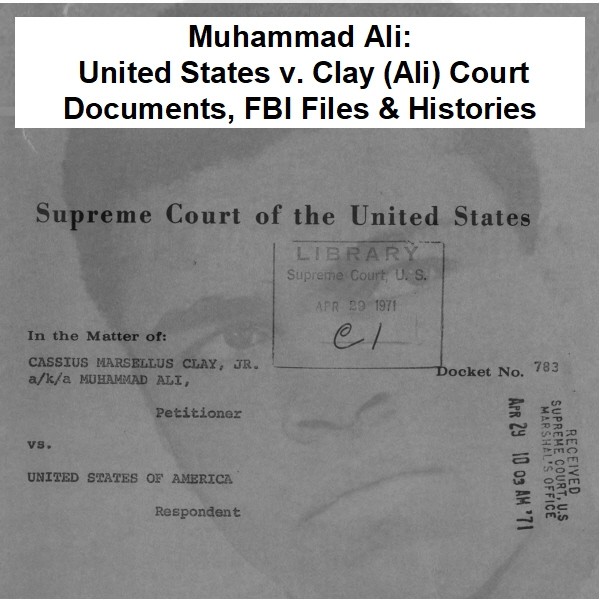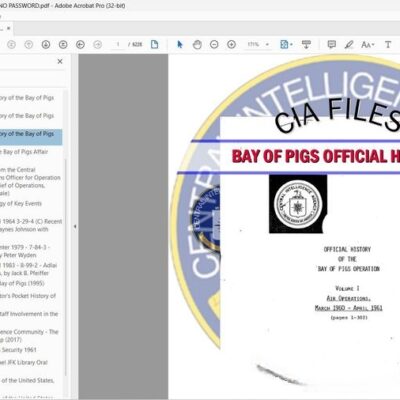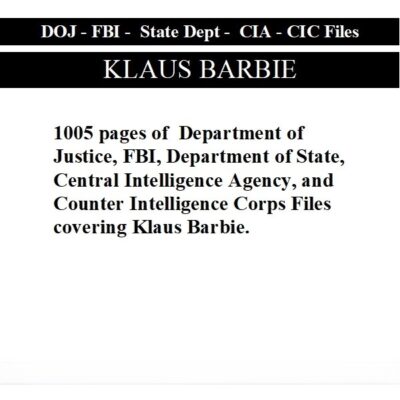“Berlin 1936 Olympics: Political and Diplomatic Documents” has been added to your cart. View cart

Muhammad Ali: U.S. v. Clay – Court Records, FBI Files & History
$19.50
Category: Political Files
Tags: fbi, FBI Files, Muhammad Ali
Description
Muhammad Ali: Conscience, Conviction, and Supreme Court Victory
1960
- 1960 Olympics: Cassius Marcellus Clay Jr. wins a gold medal in light heavyweight boxing. He returns to the United States to pursue his professional boxing career.
Early 1960s
- Religious Conversion: Cassius Clay becomes a member of the Nation of Islam, initially announcing his name as Cassius X.
1964
- Name Change to Muhammad Ali: Cassius X officially changes his name to Muhammad Ali.
1967
- April 28, 1967: Muhammad Ali, the reigning world heavyweight boxing champion for three years, reports to the Armed Forces Examining and Entrance Station in Houston but publicly refuses to take the “step forward” symbolizing his induction into the United States military.
- April 28, 1967 (Post-refusal): Boxing officials strip Ali of his titles and suspend him from boxing as a punishment for his refusal.
- May 8, 1967: A grand jury in the U.S. District Court for the Southern District of Texas indicts Muhammad Ali for failing to submit to induction.
- Trial and Conviction: Ali is tried before Judge Joe Ingraham. An all-white jury of six men and six women returns a guilty verdict in just 21 minutes. Judge Ingraham sentences Ali to the maximum penalty: five years in prison and a $10,000 fine.
- July 7, 1967: Ali testifies in support of an unsuccessful motion before Judge Ingraham, requesting permission to leave the country.
1967-1970
- Suspension and Activism: During his suspension from boxing, Ali increases his activism, touring the world and speaking to civil rights organizations and anti-war groups.
1968
- May 6, 1968: The Court of Appeals for the Fifth Circuit upholds Ali’s conviction.
- June 6, 1968: The Court of Appeals denies Ali’s motion for a rehearing by the court en banc (a meeting of all the judges on the court).
- July 15, 1968: Ali petitions for a writ of certiorari with the Supreme Court of the United States.
- July 18, 1968: The Department of Justice (DOJ) requests that the FBI disclose any wiretap surveillance involving Ali. The FBI informs the DOJ of five wiretapped conversations involving Ali.
- July 18, 1968 (Post-disclosure): The DOJ discloses the wiretap information to the Supreme Court.
- July 18, 1968 (Supreme Court Action): The Supreme Court remands Ali’s case, along with several other cases involving FBI wiretaps, to the district court for further hearings in the context of Giordino v. United States (1969).
1969
- June 1969: Judge Ingraham presides over hearings into the possibility that illegal wiretaps tainted Ali’s prosecution and conviction. He rules that even if the content of the conversations had been shared with the DOJ lawyers, the conversations were “innocuous” and could not have influenced Ali’s prosecution.
1970
- July 6, 1970: The Court of Appeals for the Fifth Circuit upholds Judge Ingraham’s ruling in the taint hearing and declines to reexamine Ali’s objections to his original conviction.
- August 19, 1970: The Court of Appeals for the Fifth Circuit denies Ali’s request for a rehearing en banc.
1971
- January 11, 1971: The Supreme Court grants certiorari on a single issue in the case: whether Ali’s conviction should be vacated because of erroneous advice by the DOJ to the effect that Ali’s beliefs were not religious.
- April 19, 1971: The Supreme Court hears oral arguments in Clay v. United States. An audio recording of these arguments is made.
- June 28, 1971: The Supreme Court issues its decision in Clay v. United States, unanimously (8–0 ruling, with Thurgood Marshall recused) reversing Ali’s conviction. The grounds for reversal are that the Department of Justice erred in advising the board of appeal that Ali’s beliefs were not sincere and not religious in nature. The Court stated, “the record shows that Clay’s [Ali’s] beliefs are founded on tenets of the Muslim religion as he understands them.”
Cast of Characters
- Muhammad Ali (Born Cassius Marcellus Clay Jr.) (1942–2016):
- Bio: A world-renowned American professional boxer, Olympic gold medalist, and activist. Born Cassius Marcellus Clay Jr., he adopted the name Muhammad Ali after converting to the Nation of Islam. He became a central figure in the anti-Vietnam War movement when he publicly refused induction into the U.S. military on grounds of conscientious objection, leading to his arrest, conviction, and a multi-year suspension from boxing. His legal battle culminated in a landmark Supreme Court victory that overturned his conviction.
- Judge Joe Ingraham:
- Bio: The judge in the U.S. District Court for the Southern District of Texas who presided over Muhammad Ali’s initial trial. He sentenced Ali to the maximum penalty of five years in prison and a $10,000 fine after an all-white jury found him guilty. He also presided over the subsequent hearings concerning potential wiretap taint.
- Thurgood Marshall:
- Bio: An Associate Justice of the Supreme Court of the United States at the time of Clay v. United States. He recused himself from Ali’s Supreme Court case due to his previous involvement in the case as a U.S. Department of Justice official.
- Winston Bowman:
- Bio: An Associate Historian at the Federal Judicial History Office, Federal Judicial Center. He authored the 105-page history United States v. Clay: Muhammad Ali’s Fight Against the Vietnam Draft, which provides a detailed narrative and legal analysis of Ali’s case.
- Federal Bureau of Investigation (FBI):
- Role: The primary federal investigative agency. The FBI was involved in conducting wiretap surveillance on Muhammad Ali, and the disclosure of these wiretaps to the Department of Justice and the Supreme Court played a role in the remand of Ali’s case back to the district court for “taint” hearings.
- Department of Justice (DOJ):
- Role: The executive department of the U.S. federal government responsible for the enforcement of the law and administration of justice. The DOJ was involved in the prosecution of Ali’s case, including providing legal advice to the selective service board of appeal regarding Ali’s religious beliefs, which the Supreme Court later found to be erroneous. They also requested and received information about FBI wiretaps involving Ali.
- U.S. District Court for the Southern District of Texas:
- Role: The federal trial court where Muhammad Ali was indicted, tried, and convicted for failing to submit to induction. Judge Joe Ingraham presided over the proceedings.
- Court of Appeals for the Fifth Circuit:
- Role: The federal appellate court that heard Ali’s initial appeal and upheld his conviction. It also heard subsequent appeals regarding the wiretap “taint” hearings and consistently upheld the lower court’s rulings against Ali before the case reached the Supreme Court.
- Supreme Court of the United States:
- Role: The highest judicial body in the United States. It ultimately heard Ali’s appeal in Clay v. United States and unanimously reversed his conviction on the grounds that the Department of Justice had erred in advising the draft board that Ali’s religious beliefs were not sincere.
Related products
-

Berlin 1936 Olympics: Political and Diplomatic Documents
$19.50 Add to Cart -

Bay of Pigs CIA Official History of the Bay of Pigs Operation
$19.50 Add to Cart -

George Herbert Walker Bush Presidential Papers
$19.50 Add to Cart -

Klaus Barbie: Department of Justice – FBI – Counter Intelligence Corps Files
$19.50 Add to Cart